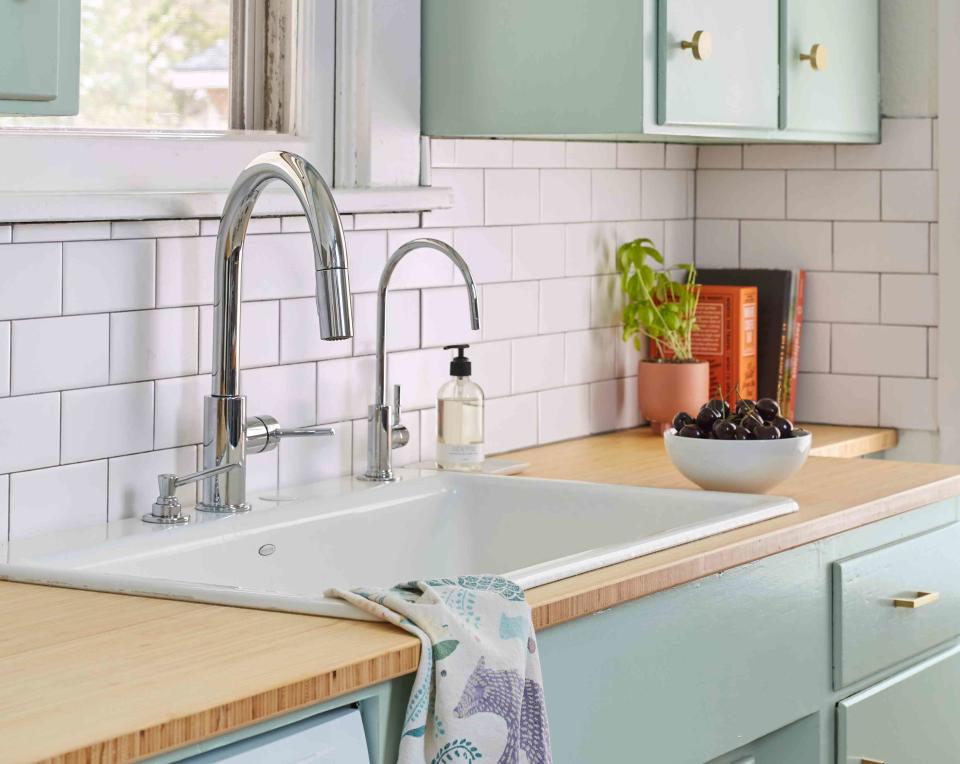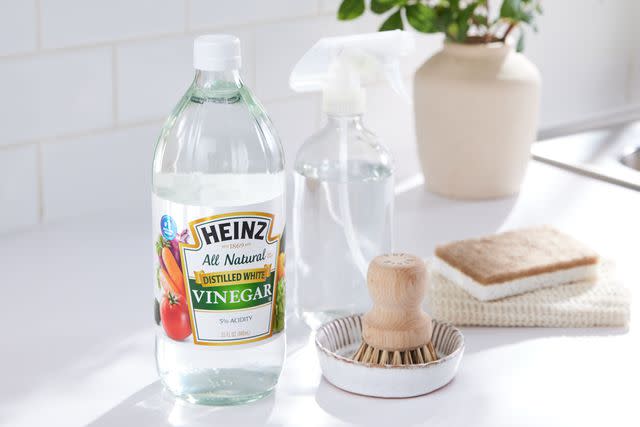This Genius TikTok Cleaning Hack Will Make Your Faucets Sparkle
Remove gunk and restore a like-new shine with this easy trick.

Adam Albright
Make your faucets sparkle with a simple ingredient you probably already have in your pantry. A TikTok cleaning hack has recently gone viral with an all-natural solution that doesn't involve any scrubbing or harsh chemicals. TikTok users suggest filling a disposable bag with vinegar, submerging the faucet in it, and watching the grime and dirt loosen.
While we tend to scrub kitchen sinks and bathtubs regularly, faucets often get overlooked and don't get the same level of attention and regular care. That means bacteria, mildew, and limescale can begin to form around the base of the faucet and if not treated, can block water flow and affect the the quality of the water.
This genius TikTok trend provides an easy solution to cleaning your faucets—and experts say it actually works and is completely safe. Here's how to clean your faucets using the viral vinegar cleaning hack.
Related: The 9 Best Kitchen Faucets of 2023 for Adding Style and Function to Your Kitchen
What Is the TikTok Vinegar Faucet Cleaning Trend?
This TikTok cleaning hack is as easy as it gets. Simply pour vinegar into a clear plastic bag and place the faucet inside it, making sure that it is submerged inside the liquid. Grab a rubber band and secure the bag in place so it doesn't slip off, and allow the faucet to soak for an hour, or until you see the mildew and gunk release into the liquid. Because vinegar is part part acid and acts as a disinfectant, it breaks down the dirt and bacteria living on the faucet.
"Using vinegar on faucets works incredibly well," says Sarah McAllister, founder and CEO of GoCleanCo. "It is our recommended method for treating hard water anywhere."
Related: How to Use Vinegar in Laundry (and When It's Best to Avoid It)
Use the Right Kind of Vinegar
Not all types of vinegar are alike when it comes to cleaning. It's important that you use white vinegar and not apple cider or red wine vinegar when cleaning. If you're worried about it leaving behind a potent lingering smell, there's no need to be nervous. The strong vinegar scent actually disappears much faster than you might think, especially if you allow some fresh air inside. If the scent really bothers you, you can also mix it with water or a few drops of essential oils to dilute it.
Related: 10 Things You Should Never Clean with Vinegar

Jacob Fox
What Else Can You Clean with Vinegar?
"Faucets, shower heads, shower glass, fridge door water dispensers—anywhere you have hard water build-up can be tackled with vinegar and you'll be amazed at the results," McAllister says. Although vinegar doesn't disinfect to the same level that bleach does, it thoroughly cleans and helps restore that like-new sparkle. It's an inexpensive ingredient you can easily purchase in large quantities at any grocery store, and you can dilute it with water depending on the surface you want to clean.
Vinegar works well to break down dirt on stainless steel surfaces and appliances, and you can use it to make your own cleaning spray. Mix it with equal parts of water and pour it into a spray bottle and mist the stainless steel surface with it, then wipe it down. Another cleaning method is to dip a microfiber cloth directly into the vinegar-water solution and clean the surface.
Related: How to Make a Vinegar Cleaning Solution for Your Home
Skip This Method If Your Faucets Have These Finishes
When it comes to cleaning various surfaces in your home, a single cleaning product isn't necessarily universally suitable or safe to use on them all. "Cleaning is a science and you need to do your research before you start haphazardly splashing chemicals around, because even something as simple as vinegar can do damage, but boy can it clean when it is used correctly," McAllister says. Because it's quite acidic, vinegar can damage certain finishes—vinegar is always a no-go on nickel and copper finishes —so McAllister recommends doing a test run before you begin cleaning. "It is always a good idea to test a small spot first and google what fixtures can safely be cleaned with vinegar," she says.
In addition to select metals reacting poorly with vinegar, some stone surfaces—like marble—also should not be cleaned with the liquid. "Vinegar can also etch marble in a moment so if your shower is marble, the runoff from the vinegar on the fixtures can damage the finish of your marble," McAllister says. Always be sure to check whether vinegar is safe to use on a particular surface or material, and test it out to prevent any potential damage.
Related: Does Vinegar Kill Germs? An Expert Discusses Homemade Cleaners
For more Better Homes & Gardens news, make sure to sign up for our newsletter!
Read the original article on Better Homes & Gardens.

